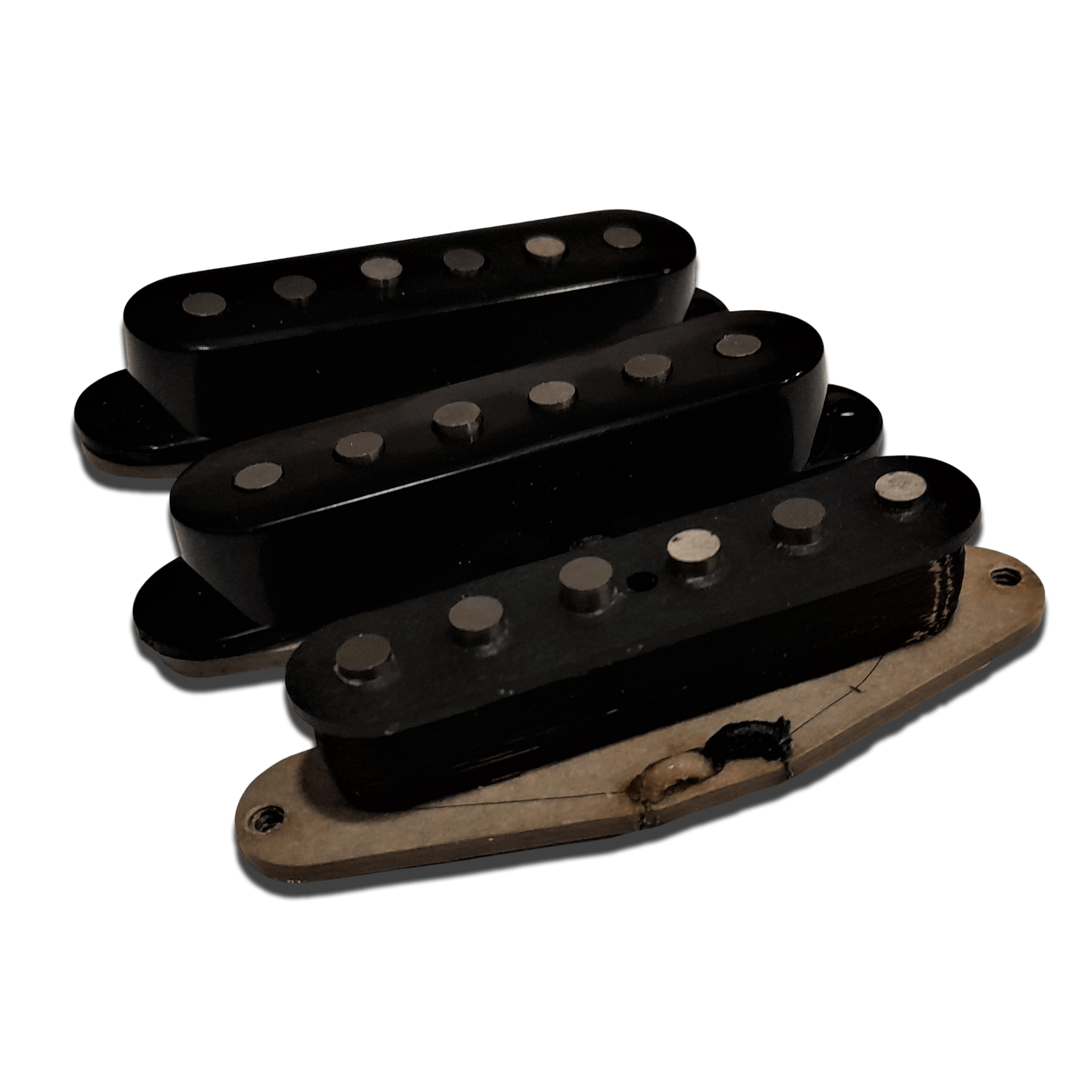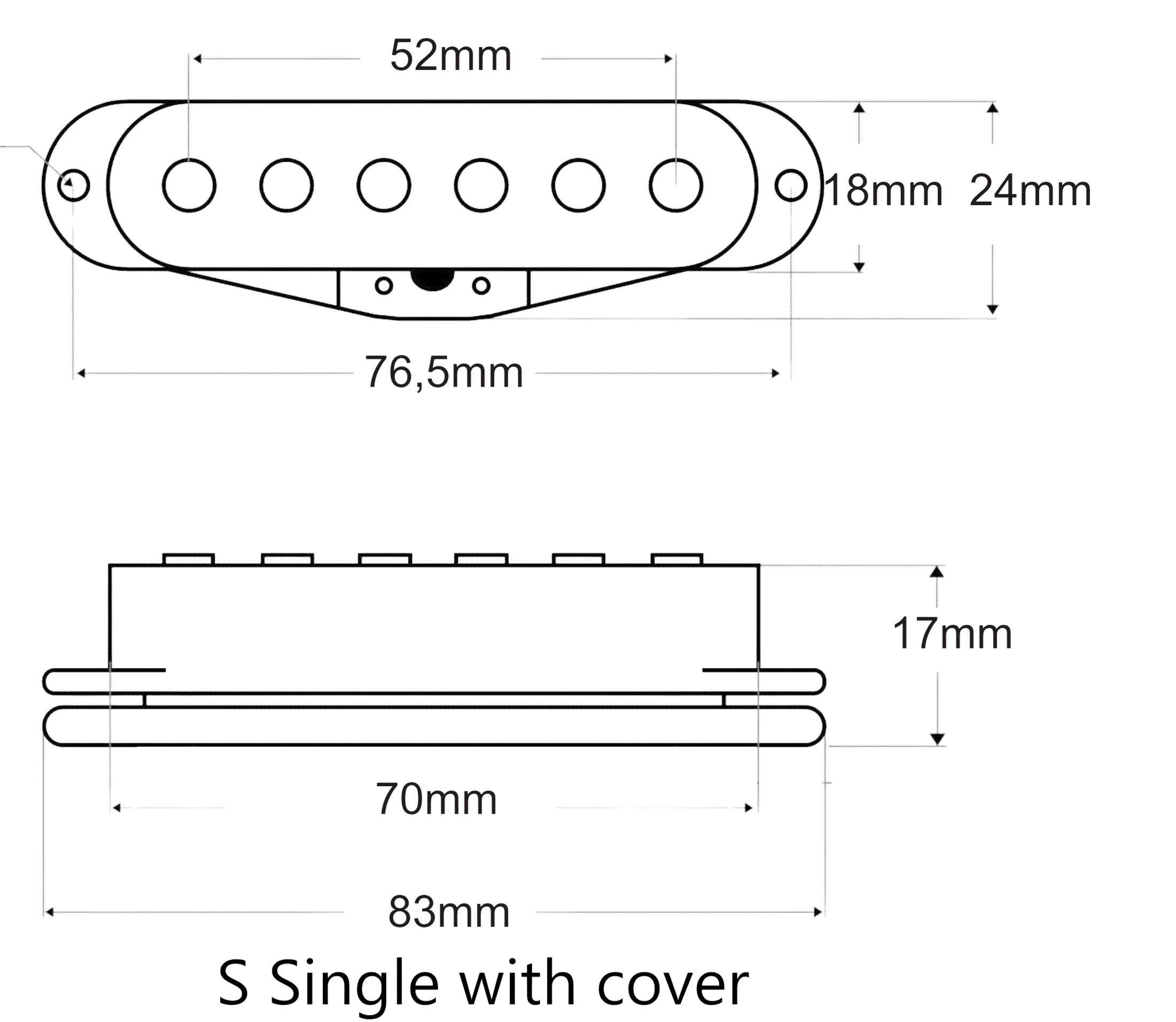
GASparkle 71
“Remember when you were young...”
Trademarks: Clean, slightly scooped sound. Sharp attack.
Styles: Pop, rock, blues
Output: Low
Retail price: 100 Euros (without VAT) per pickup
The clean sound of the early 70's. With period correct A5 0,187" diameter flat-top rods, AWG 42 plain enamel wire, and low output, the 71 provides that nice, hyper clean sound, yet with an old character. The pickup for Gilmour & Blackmore sounds of the post-1973 era, for Southern licks, but also for many British pop bands of the 80’s. Especially for those Ritchie fans we suggest the special version GASparkle 71N-RB, which is in fact a GASparkle 71B wired for neck position.
For all positions. Also available as a matched set with a RW/RP mid pickup.
Recommended Combinations*:
1. Combine GASparkle 71N-RB (neck position) with GASlite 71 (middle position) and StarGASer (bridge position) on a typical SSS Strat® style guitar and you’ll get a set with the typical early Rainbow era tone, but also with some versatility. It's our Black & More set.
2. Combine GASparkle 71 (neck position) with GASparkle 71 (middle position) and GAS and Them (bridge position) on a typical SSS Strat® style guitar and you’ll get the set for the post '73 DG tone, mainly the "Animals" tone, it's our DG-77 set.
3. Combine GASparkle 71 (middle position) with GASlite 67 (neck position) and GAStone 69 (bridge position) on a typical SSS Strat® style guitar and you’ll get a versatile set for the typical early CBS® era tone.
4. Combine GASparkle 71N-RB (neck position) with GASlite 67 (bridge position) and our speceially designed dummy coil in mid position on an SSS Strat® style guitar and you’ll get a fine "Yngwie-style" set with noiseless operation on neck and bridge positions, but with full single coil signal gain and dynamics.
*Important Note: The final tonal result will be highly dependent on the user's guitarNeck Rdc range 5,6 kOhms Neck Resonance frequency 8,8 kHz Middle Rdc range 5,7 kOhms Middle Resonance frequency 8,3 kHz Bridge Rdc range 5,9 kOhms Bridge Resonance frequency 7,5 kHz Rod magnet alloy A5 Rod diameter 0,187" Rod top Flat Winding wire (AWG, Coating) 42 Plain Enamel (60's specs) Hookup wire AWG 22 Cloth braided -

-
IntroductionFor the proper installation and wiring of your GAS Pickups, we strongly recommend letting a professional luthier or electrician perform this job in order for the pickups to be installed correctly and with no damage, which would harm the pickup’s functionality and warranty.DeliveryAll GAS S Singles are delivered with plastic covers (you may choose between white, cream, and black, or a combination of them, in case that you order more than one pickup), proper height adjustment screws (6-32 x 5/8'' pan head or oval head), and springs (or rubber tubes).WiringGAS S Singles come with two cloth hookup wires, a black and a white one. In the case of a set, if the middle pickup is RW/RP there will be a yellow wire instead of the white one. Usually the black wires will be grounded, while the white and yellow ones will go hot. However, if you install a GAS S Single along with pickups from other brands on the same guitar and face out-of-phase problems when operating with them, just swap the black with the white (or yellow) wires. For the desired wiring diagram of your guitar, please refer to the dozens of specialized websites with such diagrams, depending on the desired configuration.Pickup height or string distanceThere is a lot of conversation on this item. The fact is, there is no absolute guidance for a generic pickup height adjustment! The distance of a pickup to the strings is dependent on countless factors, such as pickup output, pickup position, string gauge, the guitar itself, the guitarist’s overall playing technique (string hitting, etc.), and the musical styles that are about to be covered. In the case of a pickup set, usually the pickup height is adjusted so all pickups show a similar output level, but this is not a rule. Our recommendation: The desired pickup height adjustment is a procedure that may last longer than you think; just start with a generic distance of 2mm on the e strings and repeat the procedure (adjust, play, listen, re-adjust) until you are satisfied. S Singles have a very strong magnetic field towards the strings, but due to our custom staggering, you may put them closer to the strings than other singles with traditional staggering, so try this out. Don’t forget to adjust in small steps (e.g., one full turn of the height adjustment screw each time) in order to easily come back one step if you are not happy with the new situation. And, trust us, if you just repeat the whole thing a couple of weeks later, you will probably find yourself re-adjusting the height again. It is something that each musician should go through by himself.DimensionsGAS S Singles are direct replacements for Strat® guitars and similar models.The pickup’s dimensions (including a pickup cover) are as follows (sizes in mm):
-
-
Almost all S Single models are available as a matched set. Can different models be mixed into a custom set?
Any GAS S Single model can be combined with any other into a custom set, following the user’s needs.
-
A year is used to identify the S Single models (e.g., 54, 59, 61, 63, etc.). Do the relevant models actually correspond to the original models of those years?
GAS Pickups are more "based on" pickups than they are exact reproductions. To create pickups that give the desired tonal qualities, we employ specs from particular eras of old, original pickups (we have the opportunity to measure and analyze dozens of them in our lab) and further enrich them with our specs. For sure GAS S Singles are direct replacements for original Strat® pickups.
-
What’s the difference between the GASparkle and GASlite models?
GASparkles go for the cleanest sparkling tone with low output and sharper attack, whereas GASlites are more for a medium-higher output and a more mellow tone. However, there are way more details in each model that result in different tone shades and dynamics, so we recommend referring to each model’s technical specs for more information.
-
A custom staggering is mentioned. What does this mean?
Old Strat® single coil pickups from the 50’s and 60’s had a specific staggering pattern (different distance between each pole and its corresponding string), following the string sets of those eras. The g string was then wound, and it was a very weak one, the b string was louder. Therefore, the g pole was placed high, and the b pole was placed low. With contemporary string gauge sets, the g string is almost always plain. It is the loudest string in the set, while the D string is now the weakest. Therefore, in order to avoid unbalanced signal output between the strings, we designed our S Singles with a custom staggering pattern, which allows for better balance and more proper pickup placement.
-
Some S singles are available with flat pole rods, others with beveled top rods. What’s the difference?
When comparing poles from the exact same alloy, flat pole rods allow a faster, sharper attack and the highest dynamic range, due to the more rapid change of the magnetic field at their edges. On the contrary, beveled top rods lead to a more smooth attack, are easier to play and offer a naturally, slightly compressed sound that results in more sustain. Watch the video below (preferably in a good audio system) and listen to these differences.
-


